"The Summer Institute of Jurilinguistics is an annual forum held to raise awareness of jurilinguistic activities in Canada and promote information sharing between legal language professionals across the country. Jurilinguistics is the study of legal discourse from a language perspective. Because each legal system (civil law and common law) and each language has its own special characteristics, jurilinguistics specifically seeks to define methods for improving the quality of legal texts while taking into account the complexity and shades of meaning of each system and the unique character of each language. It also has applications in unilingual and multilingual contexts and within single-system and multi-system legal frameworks."
- Iliana Auverana, "The Summer Institute of Jurilinguistics is expanding" (2006) 3:3 Language Update 23 (Translation Bureau)
17th Summer Institute of Jurilinguistics
17th Institute of Jurilinguistics – Legal Dictionaries and Lexicons
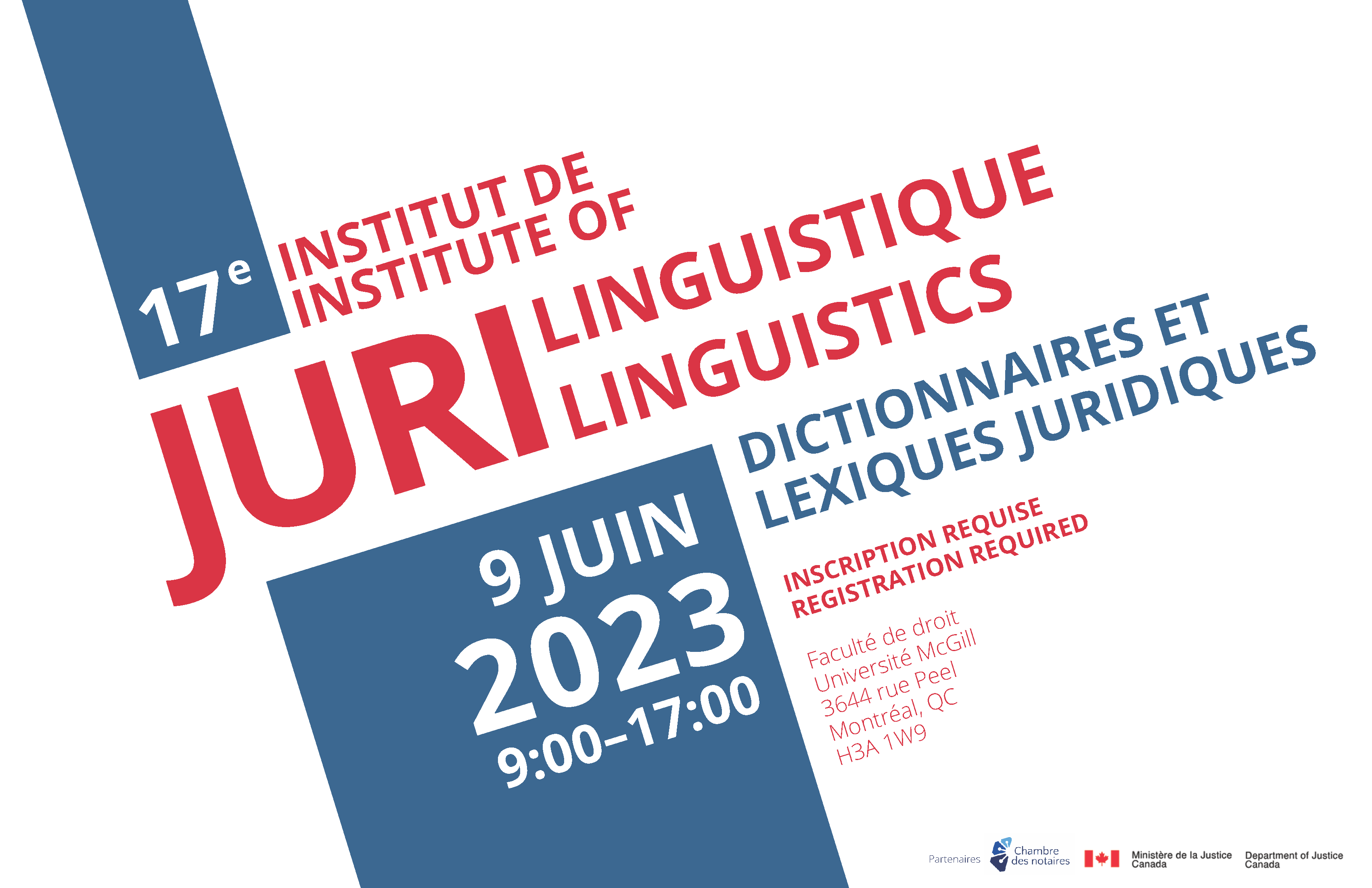
For the 17th Institute of Jurilinguistics, the Paul-André Crépeau Centre for Private and Comparative Law and the three other Canadian centres of jurilinguistics — the Centre for Legal Translation and Documentation (Ottawa), the Centre de traduction et de terminologie juridiques (Moncton) and the Centre de ressources en français juridique (Saint-Boniface) — presented the event entitled: Legal Dictionaries and Lexicons.
Program
|
9:00 |
Inscription |
|
|
9:30 |
Mot de bienvenue | Welcome Address Par Mark Antaki, Directeur du Centre Paul-André Crépeau |
|
|
9:45 |
Écrire et réfléchir un dictionnaire juridique | The Art and Craft of Legal Dictionaries Salle du Tribunal-École Maxwell-Cohen (NCDH 100) Présidence : France Allard Étienne Cossette-Lefebvre, Chercheur et avocat, Centre Paul-André Crépeau de droit privé et comparé Hugo Métivier, Chercheur et notaire, Centre Paul-André Crépeau de droit privé et comparé David D'Astous, Directeur adjoint, Centre Paul-André Crépeau de droit privé et comparé |
|
|
11:00 |
Pause | Break |
|
|
11:15 |
Les dictionnaires et lexiques juridiques, à quoi bon? | Why Legal Dictionaries and Lexicons Matter (or Not) |
|
|
Session 1A – Salle 312 NCDH L’utilisation des dictionnaires juridiques par les juristes Présidence : Francie Gow Laurence Bich-Carrière, Associée, Lavery de Billy, sencrl/L.L.P. Manon Ferrand, Notaire et doctorante, Université de Montréal |
Session 1B – Salle 101 NCDH Terminology Management in Times of Pandemic: A Multilingual Analysis Présidence : Marie-Claude L'Homme Albert Morales Moreno, Lecturer and Researcher, Universitat Oberta de Catalunya |
|
|
12:15 |
Lunch |
|
|
13:30 |
Les lexiques juridiques en contexte multilingue | Legal Lexicons for Multilingual Contexts |
|
|
Session 2A – Salle 312 NCDH Les travaux du Comité de normalisation de la common law en français Présidence : Armenouhie Vartanian Frédérique Bertrand-Le Borgne, Avocate et traductrice, Bureau de la traduction |
Session 2B – Salle 101 NCDH Legal Terminology in International Institutional Settings: Insights from the LETRINT project Présidence : Jean-Frédéric Hübsch Fernando Prieto Ramos, Professor and Director of the Transius Centre at the University of Geneva's Faculty of Translation and Interpreting |
|
|
14:30 |
Pause | Break |
|
|
14:45 |
Les outils de traduction des jugements | Tools for Translating Judicial Opinions Salle du Tribunal-École Maxwell-Cohen (Salle 100 NCDH) Présidence : Karine McLaren Aileen Doetsch, Translator, Formerly of the Bundesverfassungsgericht (German Federal Constitutional Court) Bettina Karpel, Jurilinguiste, Cour d’appel du Québec Christian Després, Chef, Service jurilinguistique à la Cour suprême du Canada |
|
|
16:15 |
Mot de clôture | Closing Remarks Par Robert Leckey, Doyen de la Faculté de droit de l’Université McGill |
|
| 16:30 | Cocktail | |
16th Summer Institute of Jurilinguistics
16th Institute of Jurilinguistics – Courts and Translation

For the 16th annual Institute of Jurilinguistics, the Paul-André Crépeau Centre for Private and Comparative Law and the three other Canadian centres of jurilinguistics — the Centre for Legal Translation and Documentation (Ottawa), the Centre de traduction et de terminologie juridiques (Moncton) and the Centre de ressources en français juridique (Saint-Boniface) presented an event entitled: Courts and Translation.
Program
|
13 h 00 |
Mots de bienvenue et de remerciement | Welcome and Thanks |
|
Mark Antaki |
|
| 13 h 10 |
La jurilinguistique dans les tribunaux, histoire et défis |
|
|
Christian Després Bettina Karpel |
|
13 h 50 |
Les difficultés liées à la traduction de jugement dans les deux langues officielles |
|
|
Frédérique Bertrand-Le Borgne Francie Gow |
|
14 h 30 |
Pause | Break |
|
14 h 45 |
L’enseignement de la traduction juridique et de la traduction de jugements |
|
|
Jean-Frédéric Hübsch Lyne Jolette |
| 15 h 25 | La relève en jurilinguistique |
|
Marie-Hélène Girard Aileen Clark Carmen Roberge |
|
| 16 h 05 | La diffusion des jugements dans les deux langues officielles sur les bases de données en ligne |
|
Francis Barragan Frédéric Pelletier |
|
| 16 h 45 |
Remerciements et mots de la fin | Acknowledgments and concluding remarks |
15th Summer Institute of Jurilinguistics
15th Institute of Jurilinguistics – Indigenous Languages and Legal Traditions
For the 15th annual Institute of Jurilinguistics, the Paul-André Crépeau Centre for Private and Comparative Law and the three other Canadian centres of jurilinguistics — the Centre for Legal Translation and Documentation (Ottawa), the Centre de traduction et de terminologie juridiques (Moncton) and the Centre de ressources en français juridique (Saint-Boniface) presented an event entitled: Indigenous Languages and Legal Traditions.
Two conversations, one in English, one in French, on Indigenous languages and legal traditions – the links between them, learning them, revitalising them.
Program
|
13 h 00 |
Mots de bienvenue et de remerciement | Welcome and Thanks |
|
|
Kirsten Anker Mark Antaki |
|
13 h 15 |
Conversation en anglais | English-language conversation |
|
|
Modératrice | Moderator : Karen Drake Robert Clifford Lindsay Borrows |
|
14 h 45 |
Pause | Break |
|
15 h 00 |
Conversation en français | French-language conversation |
|
|
Modératrice | Moderator: Kirsten Anker Naiomi Metallic Andrew John Fletcher |
14th Summer Institute of Jurilinguistics
14th Institute of Jurilinguistics – Realities of Jurilinguistics in Canada
![Realities of Jurilinguistics in Canada. Dept of Justice Canada / McGill University [Illustration on right side shows Blind Justice holding her scale in sword, with a map of Canada behind her] Realities of Jurilinguistics in Canada. Dept of Justice Canada / McGill University [Illustration on right side shows Blind Justice holding her scale in sword, with a map of Canada behind her]](https://www.mcgill.ca/centre-crepeau/files/centre-crepeau/2021-march-19-nuancescanadiennesdejurilinguistique_eng.png)
For the 14th annual Institute of Jurilinguistics, the Paul-André Crépeau Centre for Private and Comparative Law and the three other Canadian centres of jurilinguistics — the Centre for Legal Translation and Documentation (Ottawa), the Centre de traduction et de terminologie juridiques (Moncton) and the Centre de ressources en français juridique (Saint-Boniface) — joined the McGill School of Continuing Studies to host the Realities of Jurilinguistics in Canada.
This bilingual event explored the daily realities of balancing language and law in Canada, with sessions offered by professionals from diverse sectors related to jurilinguistics.
From Yukon to Newfoundland and Labrador, our guest speakers described a specific aspect of jurilinguistics, highlighting the geographical, professional and institutional diversity of a field where a wide range of issues tend to intertwine, intersect and overlap.
We shone the spotlight on the many realities and nuances of jurilinguistics in Canada, from bilingualism in Canadian territories to access to legal information, along with various issues concerning Indigenous languages, language policy, court interpreting, technology and more.
Program
Time and theme |
Issues |
Area |
Speaker |
Organization |
|
|
13:00 |
Opening remarks |
|
Quebec |
Étienne Cossette-Lefebvre & Marie-Hélène Girard |
Paul‑André Crépeau Centre for Private and Comparative Law, Faculty of Law, McGill University & Legal Translation graduate program, School of Continuing Studies, McGill University |
|
13:10 |
Terminology and jurilinguistic tools |
What are the issues surrounding English civil law dictionaries? |
Quebec |
Étienne Cossette-Lefebvre |
Paul‑André Crépeau Centre for Private and Comparative Law |
|
What are the issues surrounding the conservation of outdated dictionaries? |
Ontario |
François Blais |
Centre for Legal Translation and Documentation (CLTD) |
||
|
What are the issues surrounding French terminology? |
Manitoba |
Guy Jourdain |
Association des juristes d’expression française du Manitoba (AJEFM) |
||
|
What are the issues surrounding legal language processing technology? |
Private sector |
Michel Bergeron |
McCarthy Tétrault |
||
|
13:50 |
Recruitment and training |
What are the issues surrounding the recruitment of jurilinguists? |
New Brunswick |
Serge Rousselle |
Centre de traduction et de terminologie juridiques (CTTJ) |
|
What are the issues surrounding the training of jurists in French? |
Ontario |
Caroline Thibault |
Réseau national de formation en justice |
||
|
14:10 |
Language rights |
What are the issues surrounding the protection and recognition of Indigenous languages? |
Nunavut and Quebec |
David O. Johnston |
Office of the Commissioner of Official Languages, Government of Canada |
| What are the issues surrounding Indigenous languages in courts in Canada? | Quebec | Donald Nicholls | Cree Nation Government Department of Justice and Correctional Services | ||
|
What are the issues surrounding legal interpretation in non‑official languages? |
British Columbia |
Karin Reinhold |
Society of Translators and Interpreters of British Columbia (STIBC) |
||
|
What are the constitutional issues facing official language minority communities? |
Private sector |
Darius Bossé |
Juristes Power Law |
||
|
14:40 |
Access to justice |
What are the issues surrounding access to legal information in English in a French province? |
Quebec |
Ariane Charbonneau |
Éducaloi |
|
What are the issues surrounding access to legal information in French in a unilingual English province? |
Newfoundland and Labrador |
Étienne Vuillaume |
Francophone Justice Network of Newfoundland and Labrador |
||
|
What are the issues surrounding bilingualism in the territories? |
Yukon |
André Bourcier |
French Language Services Directorate, Government of Yukon |
||
|
15:10 |
Bilingualism and bijuralism in federal institutions |
What are the issues of bilingualism and bijuralism surrounding the drafting of judgments at the Supreme Court? |
Canada |
Christian Després |
Reports Branch, Supreme Court of Canada |
|
What are the issues of bilingualism and bijuralism surrounding the drafting of legislation in Canada? |
Canada |
Jean-Paul Chapdelaine |
Justice Canada, Bijuralism and Advisory Services Section |
||
|
What are the issues surrounding the practice of jurilinguistics in the Treaty Law Division? |
Canada |
Aleksandra Koziorowska |
Global Affairs Canada, Treaty Law Division |
||
|
15:40 |
Closing remarks |
||||
13th Summer Institute of Jurilinguistics
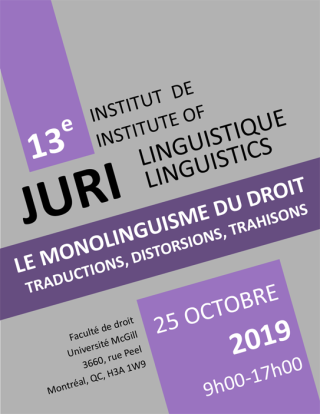 13th Institute of Jurilinguistics – The Monolingualism of Law: Translations, Treasons, Distortions
13th Institute of Jurilinguistics – The Monolingualism of Law: Translations, Treasons, Distortions
25 October 2019, 9:00-17:00
The law speaks its own language. Any legal operation or statement of the law entails a linguistic transformation. For example, humans become “legal persons” and animals become “things.” Thus, the law cannot only describe, but must necessarily modify the situations it encounters. The language of the law qualifies, categorizes, reformulates and even euphemizes the situations of the litigants and their relationships. Such processes may distort reality, and in doing so deny the existence of important social problems. It is in this sense that we sometimes speak of the difficulty of adapting the language of the law to the social world.
This linguistic transformation affects the situation and realities of marginalized groups. Some litigants are isolated from the law; their concerns erased, delegitimized or discredited. For example, the sex and gender binaries that underlie the legal categories of “men” and “women” exclude non-binary persons. Similarly, terms like “mother” and “father” leave little room for social situations outside hetero-parenthood as well as those relating to multiparenthood. Conversely, legal language may also serve an alleviative function when conflicts are expressed in legal forms. “Legal personhood” may succeed in accommodating the infinite diversity of human identities.
In any case, the translation of reality into legal language is fraught with consequences. This Summer Institute aims to identify the linguistic operations that conceal, distort and deny the reality of marginalized people, as well as to explore the harmonizing function of legal language. These are key issues that translators, jurilinguists legal practitioners and scholars alike face on a daily basis.
The event, initiated by the Paul-André Crépeau Centre for Private and Comparative Law, is being conducted in collaboration with the three other centres of the jurilinguistic network - the Centre for Legal Translation and Documentation (Ottawa), the Centre de traduction et terminologie juridiques (Moncton) and the Centre de ressources en français juridique (St-Boniface) - and with the financial support of the Department of Justice Canada through the Access to Justice in Both Official Languages Support Fund as part of Canada's Roadmap for Official Languages 2013-2018.
Program
|
8h30 |
Inscription | Registration (Atrium) |
|
|
9h00 |
Mots de bienvenue | Opening Remarks (Moot Court)Introduction L'importance de la jurilinguistique dans un monde légal bijuridique et bilingue: développements récents à la Cour d'appel du Québec | The Importance of Jurilinguistics in a Bijural and Bilingual Legal World: Recent Developments at the Court of Appeal of Quebec. |
|
Séance plénière | Plenary session (Moot Court)Le pouvoir des mots |
||
|
9h40–9h45 |
Avant-propos |
|
|
9h45–11h00 |
Présidence: Marie-Claude Prémont, Professeure, ENAP
|
|
|
11h00–11h20 |
Pause | Break (Atrium) |
|
Ateliers du matin | Morning workshops |
||
|
11h20–12h20 |
Langue, Droit et MinoritésAtelier 1A | Workshop 1A (salle 312-316) Présidence: Karine McLaren
|
Langue, Droit et FiliationAtelier 1B | Workshop 1B (salle 101) Présidence: Alexandra Popovici
|
|
12h35–13h35 |
Pause du midi | Lunch (Atrium) |
|
Ateliers de l'après-midi | Afternoon Workshops |
||
|
13h45–14h45 |
Langue, Droit et HandicapsAtelier 2A | Workshop 2A (Moot Court) Présidence : Aileen Clark
|
Langue, Droit et AnimauxAtelier 2B | Workshop 2B (salle 312-316) Présidence : France Allard
|
|
14h45–15h00 |
Pause | Break (Atrium) |
|
|
15h00–16h00 |
Langue, Droit et ViolencesAtelier 3A | Workshop 3A (salle 312-316) Présidence : Vincent Forray
|
Langue, Droit et GenreAtelier 3B | Workshop 3B (Moot Court) Présidence : María Sierra Córdoba Serrano
|
|
14h45–15h00 |
Pause | Break (Atrium) |
|
Môt de cloture | Closing Remarks (Moot Court)Linguistique et droits | Linguistic and Rights |
||
|
16h00–16h50 |
Présidence: Vincent Forray Law, Language, and Oppression: Closing Remarks |
|
|
16h50 |
Cocktail (Atrium) |
|
12th Summer Institute of Jurilinguistics
CODER/DÉCODER : LINGUISTIQUE ET CONCEPTS JURIDIQUES / CODING/DECODING : LINGUISTICS & LEGAL CONCEPTS
June 15, 2018, McGill University

The twelfth edition of the Summer Institute of Jurilinguistics, organized by the Paul-Andre Crépeau Centre for Private and Comparative Law in collaboration with the Network of Jurilinguistics Centres, was held on June 15th, 2018 at McGill’s Faculty of Law. The event brought together more than 130 participants from different fields pertaining to jurilinguistics.Cette année, l’Institut portait sur le thème « Coder/Décoder : Linguistique et Concepts Juridiques ». Le programme scientifique de la journée a été organisé de façon à permettre la tenue de deux plénières et quatre ateliers, couvrant plusieurs thématiques grâce aux exposés des conférenciers et conférencières.
The theme was “Coding/Decoding: Linguistics & Legal Concepts” focused on how different aspects of linguistics play a role in our understanding and use of legal concepts, particularly pertaining to issues of access to justice. The program for the day consisted of two plenary sessions and four workshops, covering a wide range of subjects presented by various speakers.

Véronique Bélanger, assistant dean of McGill’s Faculty of Law and Professor Yaëll Emerich, director of the Crépeau Centre opened the event and delivered words of welcome. The first plenary, moderated by Professor Johanne Poirier (McGill University), was devoted to the topic of drafting legislation in bi/multi-jural and bi/multilinguistic contexts, and the unique challenges that arise therein. Professor Karine McLaren, director of the Université de Moncton’s Centre de traduction et de terminologie juridiques, gave the first presentation, “Le bijuridisme canadien et ses conséquences sur les techniques de rédaction législative bilingue,” in which she discussed the interaction between the common law and civil law traditions and its consequences on drafting federal laws. To follow, Mtre France Allard, senior general counsel and comparative law expert for the Department of Justice Canada, in “Les lois d’harmonisation : un long processus tranquille,” discussed the 20-plus year process to harmonize federal laws so that both French and English versions take into account civil law and common law traditions. Then, Professor Isabelle Pingel (Université Paris-1 Panthéon-Sorbonne), in “Coder/décoder dans l’Union européenne : la traduction dans tous ses états,” gave a comparative European perspective, explaining the unique challenges the EU faces, with its 28 member states and 24 official languages.
 Two morning workshops tackled the broad topic of linguistics and interpretation. In one, Kathy Bellefleur moderated two presentations on the semiotics of law, one by Dr. Sandy Lamalle, consultant and Associate Researcher at Concordia University, and the other by Professor Jeffrey Ellsworth (Ramapo College of New Jersey), where topics discussed included the approaches and tools used to understand, interpret and analyze law, as well as contemporary challenges in this field. At the same time, Professor María Sierra Córdoba Serrano (McGill University), discussed new initiatives in jurilinguistics education in Quebec, notably the Graduate Certificate in Legal Translation offered by McGill’s School of Continuing Education, in a session moderated by Lyne Jolette.
Two morning workshops tackled the broad topic of linguistics and interpretation. In one, Kathy Bellefleur moderated two presentations on the semiotics of law, one by Dr. Sandy Lamalle, consultant and Associate Researcher at Concordia University, and the other by Professor Jeffrey Ellsworth (Ramapo College of New Jersey), where topics discussed included the approaches and tools used to understand, interpret and analyze law, as well as contemporary challenges in this field. At the same time, Professor María Sierra Córdoba Serrano (McGill University), discussed new initiatives in jurilinguistics education in Quebec, notably the Graduate Certificate in Legal Translation offered by McGill’s School of Continuing Education, in a session moderated by Lyne Jolette.
Two workshops about linguistics and trial proceedings took place during the afternoon. Mtre Laurence Bich-Carrière, lawyer at Lavery, de Billy, discussed emoji interpretation and its relation to proof in a presentation moderated by Marie-Andrée Plante. In the other, Professor Sylvie Monjean-Decaudin, director of the Université de Cergy-Pontoise’s Centre de Recherche Interdisciplinaire en Juritraductologie, compared the Canadian and European approaches to jurilinguistics and juritraductology in a workshop moderated by Jelena Holland.
The last plenary, moderated by Aileen Clark, focussed on the role of linguistics rights as they pertain to human rights, particularly insofar as they are a powerful tool for equality and social justice, protecting and recognizing minorities and ensuring access to education. Lindsay Borrows, lawyer at West Coast Environmental Law, discussed language as a human right, and how strengthening indigenous languages through law is an important part of the decolonization project. Then, Roger Jones (Assembly of First Nations), provided an overview of the state of indigenous languages in Canada, particularly in light of international treaties and the Constitution, as well as the reconciliation process. Following that, Frédéric Bérard, Lawyer, Ph.D in Law, and co-founder of the National Observatory of Language Rights, reflected on potential asymmetries in the judicial interpretation of language rights for linguistic minorities in Canada.
The Honourable Nicholas Kasirer concluded the twelfth edition of the Summer Institute by discussing the importance of jurilinguistics within the law and how our understanding of fundamental legal concepts might be framed according to the different approaches to legal translation explored throughout the day’s events. He then thanked the participants and invited all to end the day with a celebratory cocktail. The organizers, the administrative officers from the Network of Jurilinguistics Centres, and the participants all expressed their appreciation for this annual gathering.
Click here to view the program of the 12th Summer Institute of Jurilinguistics ![]() institut_dete_de_jurilinguistique_-_programme.pdf.
institut_dete_de_jurilinguistique_-_programme.pdf.
This conference was recognized by the Barreau du Québec and the Chambre des notaires du Québec as fulfilling 5 hours and 45 minutes of Continuing Legal Education.
The Crépeau Centre would like to thank Justice Canada for its financial support from the Access to Justice in Both Official Languages Support Fund through the Action Plan for Official Languages 2018-2023: Investing in Our Future.
11th Summer Institute of Jurilinguistics
LAW(S), LANGUAGE(S) & SOCIETY(IES) / DROIT(S), LANGUE(S) ET SOCIÉTÉ(S)
Faculté de droit, Université McGill, 16 juin 2017
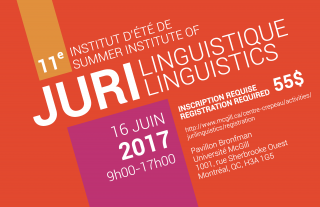 The eleventh edition of the Summer Institute of Jurilinguistics was held on June 16th 2017 at McGill University. Organized by the Paul-André Crépeau Centre for Private and Comparative Law, in collaboration with other members of the Network of Jurilinguistic Centres, the event brought together more than 130 participants from different fields tied to jurilinguistics.
The eleventh edition of the Summer Institute of Jurilinguistics was held on June 16th 2017 at McGill University. Organized by the Paul-André Crépeau Centre for Private and Comparative Law, in collaboration with other members of the Network of Jurilinguistic Centres, the event brought together more than 130 participants from different fields tied to jurilinguistics.
This year, the theme of the Institute was “Law(s), Languages & Society(ies)”. The scholarly programme for the day included two plenary sessions and four workshops, covering a wide range of subjects presented by various speakers.

Professor Yaëll Emerich, director of the Crépeau Centre, delivered words of welcome to open the event. The first plenary, moderated by Karine McLaren, was devoted to exploring links between jurilinguistics and identity. Dr. Janny HC Leung from the University of Hong Kong gave the first presentation, The Nomos of Multilingual Law, on the consequences of official State multilingualism. To follow, Javier Moreno-Rivero, in Giving a Voice to the Unheard: Translation as a Mechanism of Shaping Linguistic Identity in Multilingual Legal Settings, discussed challenges posed by the lack of knowledge of lesser-known languages in courts. Then Dr. Juliette Scott, director of the Legal Translation Hub (Institute of Advanced Legal Studies and the Institute of Modern Languages Research, School of Advanced Study, University of London, U.K.), elucidated the challenges of legal translation outside of official institutions.
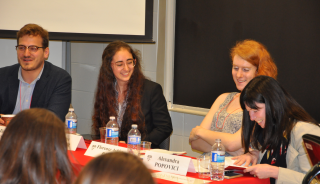
Two morning workshops were devoted to jurilinguistics and diversity. In one, Professor Alexandra Popovici moderated two presentations. First, Mtre Michaël Lessard and Suzanne Zaccour (LL.M. candidate, University of Toronto) explored the feminisation of legal vocabulary and syntax toward more inclusive redaction. Next, Florence Ashley Paré (LL.M. candidate, McGill University), discussed the position of trans persons in Quebec legislation. At the same time, Professor Lorena Sekwan Fontaine (University of Winnipeg) discussed the protection of Indigenous language rights in a session moderated by Professor Kirsten Anker.

Two workshops about jurilinguistics and accessibility took place during the afternoon. Mtre Stéphanie Roy, lawyer and co-founder of En Clair Service-Conseil Inc., presented on the vulgarization of legal documents, moderated by Laurence Endale. In the other, Jeff Staflund, Chief Interpreter with the New Brunswick Translation Bureau in Fredericton, conducted a workshop on the challenges facing interpreters when translating in court. That workshop was moderated by Aileen Clark.
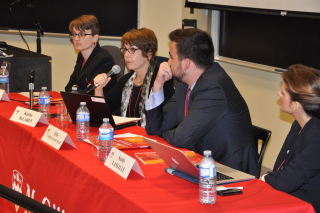
Jurilinguistics and equality were the subject of the last plenary, presided by Mtre Laurence Bich-Carrière. Mtre Érik Labelle Eastaugh, lawyer at CazaSaikelay, discussed Supreme Court of Canada jurisprudence related to equality vis-à-vis language rights. Then Karine McLaren, director of the Centre de traduction et de terminologie juridiques of the University of Moncton, explored the importance of drafting methods in countries where legislative bilinguism is required. Dr. Sandy Lamalle, international consultant and research associate at Concordia University, reflected on the practical importance of jurilinguistics in international human rights.
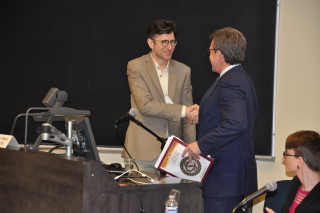
The Honourable Clément Gascon concluded the eleventh edition of the Summer Institute by celebrating the important role of jurilinguistics within the law and highlighting the essential work of those who devote to it their time and effort. Dean Robert Leckey thanked the participants and invited all to end the day with a celebratory cocktail. The organizers, the administrative officers from the Network of Jurilinguistics Centres, and the participants all expressed their appreciation for this annual gathering.
Click ![]() here to view the program of the 11th Summer Institute of Jurilinguistics.
here to view the program of the 11th Summer Institute of Jurilinguistics.
This conference was recognized by the Barreau du Québec and the Chambre des notaires as fulfilling 5 hours of Continuing Legal Education.
The Crépeau Centre would like to thank Justice Canada for its financial support from the Access to Justice in Both Official Languages Support Fund through the Roadmap for Canada's Official Languages (2013-2018).
10th Summer Institute of Jurilinguistics
Faculty of Law, McGill University
Montreal, Quebec, Canada, June 10th 2016
 The 10th edition of the Summer Institute of Jurislinguistics addressed some main themes and contemporary challenges of jurislinguistics.
The 10th edition of the Summer Institute of Jurislinguistics addressed some main themes and contemporary challenges of jurislinguistics.
See the programme: ![]() programme_10e_institut_10juin2016.pdf
programme_10e_institut_10juin2016.pdf
The event was accredited as mandatory continuing education with the Barreau du Québec (5,25 hours).
9th Summer Institute of Jurilinguistics
Faculty of Law, McGill University
Montreal, Quebec, Canada, July 10th 2015
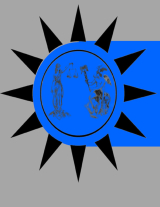 On behalf of all members of the Network of Jurilinguistics Centres, it is with great pleasure that the Paul-André Crépeau Centre for Private and Comparative Law hosted this unique annual event.
On behalf of all members of the Network of Jurilinguistics Centres, it is with great pleasure that the Paul-André Crépeau Centre for Private and Comparative Law hosted this unique annual event.
For its ninth edition, the Summer Institute of Jurilinguistics focused on the topic of legal lexicography.
Dictionaries identify, translate and define: they are key witnesses in the evolution of legal vocabulary. Dictionaries bring to light both practical and theoretical issues with regards to the accessibility of legal words. They are at the heart of our reflections as we search for a common language in a multilingual and legally pluralistic context. For these reasons, the place and purpose of dictionaries as major tools of legal knowledge was the guiding theme of the day. Usage and methodology were discussed through national and international perspectives.
Presentations were divided between plenary sessions and parallel workshops. Programme and summaries of the presentations are available here: ![]() summer_institute_of_jurilinguistics_en.docx.
summer_institute_of_jurilinguistics_en.docx.
The event was accredited as mandatory continuing education with the Barreau du Québec (5.5 hours).
8th Summer Institute of Jurilinguistics
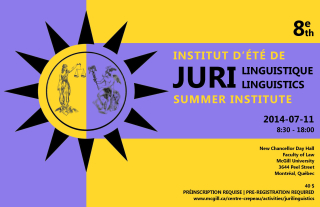 The Paul-André Crépeau Centre for Private and Comparative Law held the 8th Summer Institute of Jurilinguistics on July 11, 2014, in collaboration with the other members of the Network of Jurilinguistic Centres.
The Paul-André Crépeau Centre for Private and Comparative Law held the 8th Summer Institute of Jurilinguistics on July 11, 2014, in collaboration with the other members of the Network of Jurilinguistic Centres.
The theme was “Language, Law and Otherness,” which allowed participants to reflect on justice and our relations to others through the lenses of legal language, legal interpretation and legal translation, as well as linguistic rights.
Methodologies for legal translation as well as issues regarding the different meanings of legal terms in foreign languages were discussed from a European perspective. This provided comparative perspectives and exchanges. Practical and theoretical issues with respect to translating legal decisions, commentaries and legislation were examined. The Institute also allowed participants to study questions of legislative interpretation, as well as problems regarding linguistic rights from an aboriginal perspective, and finally language policy issues from a philosophical point of view.
The 8th Summer Institute of Jurilinguistics was an opportunity to exchange ideas on legal translation and interpretation, access to justice and protection of linguistic rights with the benefit of European and Canadian perspectives.
The programme can be found here: ![]() Programme - 8th Summer Institute
Programme - 8th Summer Institute
7th Summer Institute of Jurilinguistics

The seventh edition of the Summer Institute of Jurilinguistics was held on 30 August 2013 at the Faculty of Law of McGill University. It was organized by the Paul-André Crépeau Centre for Private and Comparative law, in collaboration with the other members of the Network of Jurilinguistic Centres. The Institute brought together more than 120 participants drawn from different fields with ties to Jurilinguistics.
The theme of this year’s Institute was "Word Games: Translating. Writing. Thinking Law" and it was an ideal forum to ponder from multiple perspectives the importance of properly translating, writing and thinking law, the means to do so, as well as the difficulties inherent to such an undertaking.
The scholarly programme for the day was shared amongst two plenary sessions and four thematic workshops. Participants were able to select two of the four workshops.
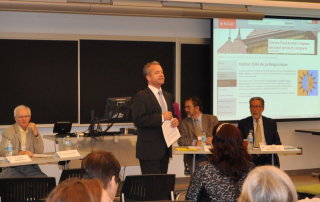
At the conclusion of the morning plenary, participants proceeded to a series of workshops that focused on how law is written, with reference to definitions in Codes and legislation.
The two morning workshops explored how to write definitions in the legal context, in particular with respect to legislative drafting. The first, led by Richard Tremblay, Professor of Legislative Drafting at Université Laval, and moderated by Professor Patrick Forget from the Département des sciences juridiques of the Faculté de science politique et de droit of UQAM, was entitled Pour une approche plus fonctionnelle en matière de rédaction législative [ppt]. The second workshop, discussing the interpretation and the drafting of bilingual laws in Canada, was led by Karine McLaren, translator and jurist at the CTTJ, and moderated by Jean Frédéric Ménard [streaming audio].
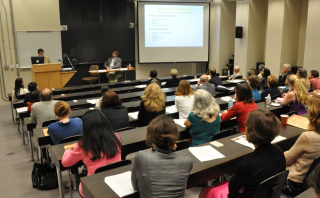
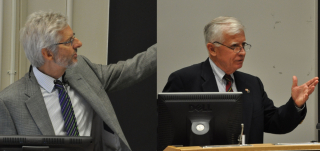
The closing plenary, titled “Communication et accessibilité du droit”, shed light on the various aspects and impacts of the specialization of legal language in terms of access to justice, particularly in linguistic minority settings [streaming audio]. As Dean Cornu stated, “la langue du législateur est (et surtout devrait-être) sobre, dépouillée, sans emphase, enflure ni fioritures, seulement attentive à dire le nécessaire, simplement ordonnée à son utilité sociale” (Gérard Cornu, Linguistique juridique).
Chaired by Gérard Snow, the plenary included three panellists. First, Andréa Suurland, president of Linguistic Rights McGill, offered her reflections on the accessibility of legal sources in English and French for both legal traditions within Canada. Ms. Suurland’s contribution was entitled Réflexions sur la disponibilité des sources juridiques en français dans les provinces de common law, et en anglais dans la province du Québec : corrélation avec l’accès à la justice. Second, Stéphanie Roy, plain language specialist at Éducaloi, discussed the importance of plain language in legal communication. Finally, Joseph-Yvon Thériault, Professor of Sociology at UQAM, gave a presentation on sociology and linguistic rights in Canada.
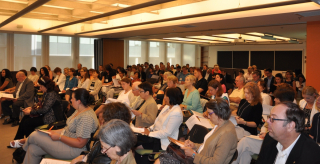
The seventh Summer Institute was a striking success, a reminder that these institutes remain exemplary as scholarly encounters concerning jurilinguistics. The organizers, the administrative officers of each of the centres which form the Network of Jurilinguistics Centres, and the participants, all expressed their enthusiastic reaction to this meeting.
Programme - 7th Summer Institute [pdf]
This day was made possible due to the support of Justice Canada. The Crépeau Centre also extends its thanks to the Dean’s Office.
The Institute was accredited for 5.25 hours of continuing legal education by the Barreau du Québec.
6th Summer Institute of Jurilinguistics
![]()
The sixth edition of the Summer Institute of Jurilinguistics was held on 27 August 2012 at the Faculty of Law of McGill University. It was organized by the Paul-André Crépeau Centre for Private and Comparative law (formerly known as the Quebec Research Centre of Private and Comparative Law), in collaboration with the other members of the Network of Jurilinguistic Centres. The Institute brought together more than 120 participants drawn from different fields with ties to Jurilinguistics.
The theme of the Institute was "Law(s), Languages(s) and Border(s)" and it was an ideal forum to think about the challenges of law and languages, in an era where physical, intellectual and linguistic borders are blurring.
The scholarly programme for the day was shared amongst two plenary sessions and three workshops. The plenary sessions offered a theoretical perspective on law, language and borders. The workshops allowed for exchanges that favoured discussion of the practical factors and the difficulties which are part and parcel of legal language in a context where borders are blurring.
The day opened with words of welcome from Professor Daniel Jutras, Dean of the Faculty of Law of McGill University. Then followed the first plenary session, an homage to Paul-André Crépeau and to jurilinguistics, moderated by Mtre France Allard [streaming audio].
First, the honourable Nicholas Kasirer, judge on the Quebec Court of Appeal, gave a presentation entitled Languages and Courtesy in Law. Following this contribution, Prof. Patrick Forget, of the Département des sciences juridiques of the Faculté de science politique et de droit of UQAM, gave a presentation entitled Les phraséologismes verbaux en droit : à la frontière de la langue commune et de la langue du droit.
There were two workshops in the course of the morning. The first was moderated by Professor Adrian Popovici and concerned the concept of illicitness (illicéité). Led by Professor Mariève Lacroix, of the Civil Law Section of the University of Ottawa, the workshop entitled Au-delà des frontières de l’illicéité : exploration conceptuelle à travers un prisme linguistique described the concept of illicitness and its legal use in Quebec, French, Swiss and German laws in terms of extra-contractual liability [streaming audio]. The second workshop, moderated by Professor Robert Leckey, discussed the importance of keywords and linguistic and conceptual shorthand implicit to constitutional law. It was led by Professor Mark Antaki, of the Faculty of Law of McGill University [streaming audio].
The afternoon plenary section, chaired by Alexandra Popovici, doctoral candidate at the Faculté de droit of Université Laval and researcher at the Paul-André Crépeau Centre for Private and Comparative Law, was led by Mrs. Valérie Boudreau, terminologist at the Translation Bureau (Government of Canada). Mrs. Boudreau’s presentation discussed the sources used in the standardization of common law in French [streaming audio].
The last plenary session, moderated by Mtre Laurence Bich-Carrière, explored law and the borders of language. This session was a superb opportunity for sustained inquiry into legal language and, specifically, the challenges associated with the specialized language of law [streaming audio]. Professor Gérald Delabre of Université Lyon 3 discussed the linguistic aspects of his teaching experiences. His presentation was entitled Langues frontières du droit et droit aux frontières des langues. Following this presentation, Professor Lionel Smith, Director of the Paul-André Crépeau Centre for Private and Comparative Law, presented a case study on the pitfalls of the bilingual statutory interpretation.
The sixth Summer Institute was a striking success, a reminder that these institutes remain exemplary as scholarly encounters concerning jurilinguistics. The organizers, the administrative officers of each of the centres which form the Network of Jurilinguistics Centres, and the participants, all expressed their enthusiastic reaction to this meeting.
Programme: 6th Summer Institute of Jurilinguistics [pdf]
This day was made possible due to the support of Justice Canada. The Crépeau Centre also extends its thanks to the Dean’s Office.
5th Summer Institute of Jurilinguistics
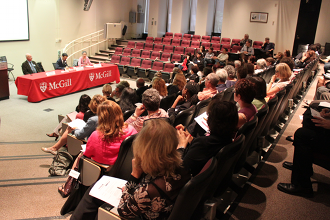 The fifth edition of the Summer Institute of Jurilinguistics was held on 26 August 2011 at the Faculty of Law of McGill University. It was organized by the Quebec Research Centre of Private and Comparative Law (now known as the Paul-André Crépeau Centre for Private and Comparative Law), McGill University, in collaboration with the other members of the Network of Jurilinguistic Centres. The Institute brought together more than a hundred participants drawn from different fields with ties to jurilinguistics.
The fifth edition of the Summer Institute of Jurilinguistics was held on 26 August 2011 at the Faculty of Law of McGill University. It was organized by the Quebec Research Centre of Private and Comparative Law (now known as the Paul-André Crépeau Centre for Private and Comparative Law), McGill University, in collaboration with the other members of the Network of Jurilinguistic Centres. The Institute brought together more than a hundred participants drawn from different fields with ties to jurilinguistics.
The scholarly programme for the day was shared amongst two plenary sessions and four workshops. The plenary sessions offered a comparative view of law and language, with equal parts of scholarship and orientation towards practice. The workshops allowed for exchanges in small groups, favouring discussion of the practical factors and the difficulties which are part and parcel of legal translation.
 The day opened with words of welcome from Robert Leckey, acting director of the Centre. Then followed the first plenary session, moderated by Prof. Víctor Muñiz-Fraticelli. It concerned Jurilinguistics in the academic realm, providing a more specific view of the positions held in Europe and in Canada on the topic.
The day opened with words of welcome from Robert Leckey, acting director of the Centre. Then followed the first plenary session, moderated by Prof. Víctor Muñiz-Fraticelli. It concerned Jurilinguistics in the academic realm, providing a more specific view of the positions held in Europe and in Canada on the topic.
First, Prof. Christopher Goddard, from the Riga Graduate School of Law in Latvia, gave a presentation entitled “A Voice in the Wilderness? Legal Linguistics in Search of a Place in the Curriculum”. To listen to Prof. Goddard’s presentation, please click here: Christopher Goddard . Following this contribution, Prof. Aline Grenon, of the Faculty of Law, Common Law Section, University of Ottawa, spoke as a Canadian respondent. The text of Prof. Grenon’s presentation is available by clicking here: La jurilinguistique dans le monde académique - Aline Grenon [pdf] and you can also listen to her presentation by clicking here: Aline Grenon .
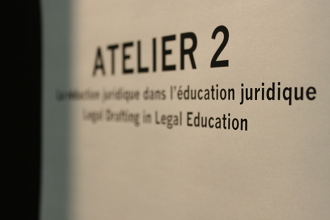 There were two workshops in the course of the morning. The first was moderated by Caroline Cassagnabère and concerned the teaching of law in Spanish. Entitled “Teaching Law in Spanish for a Better Understanding: Insights from the Grupo Hispano at the McGill Faculty of Law”, this workshop was presented by Nelcy López Cuéllar, D.C.L. candidate (McGill Faculty of Law). It described the limitations posed by teaching Latin America law in French or in English. To listen to Ms López Cuéllar’s presentation, please click here: Nelcy López Cuéllar . The second workshop was moderated by Prof. Mariève Lacroix of the Faculty of Law, Civil Law Section, University of Ottawa. It concerned teaching the skills of a legal professional in Quebec and was presented by Nadia Chammas, research scholar (QRCPCL). To listen to Ms Chammas’s presentation, please click here: Nadia Chammas .
There were two workshops in the course of the morning. The first was moderated by Caroline Cassagnabère and concerned the teaching of law in Spanish. Entitled “Teaching Law in Spanish for a Better Understanding: Insights from the Grupo Hispano at the McGill Faculty of Law”, this workshop was presented by Nelcy López Cuéllar, D.C.L. candidate (McGill Faculty of Law). It described the limitations posed by teaching Latin America law in French or in English. To listen to Ms López Cuéllar’s presentation, please click here: Nelcy López Cuéllar . The second workshop was moderated by Prof. Mariève Lacroix of the Faculty of Law, Civil Law Section, University of Ottawa. It concerned teaching the skills of a legal professional in Quebec and was presented by Nadia Chammas, research scholar (QRCPCL). To listen to Ms Chammas’s presentation, please click here: Nadia Chammas .
 Two other workshops took place during the afternoon. The first, moderated by France Allard, was presented by Gladys Matthews, a certified court interpreter in the State of Indiana, and concerned legal translation in judicial matters, as well as training for this kind of translation, in the United States. The second workshop, moderated by Prof. Adrian Popovici, was presented by Eve-Marie Préfontaine, Nunavik Justice Officer (Makivik). Mtre Préfontaine addressed the issues and initiatives with respect to justice and language in Nunavik. To listen to Mtre Préfontaine’s presentation, please click here: Eve-Marie Préfontaine .
Two other workshops took place during the afternoon. The first, moderated by France Allard, was presented by Gladys Matthews, a certified court interpreter in the State of Indiana, and concerned legal translation in judicial matters, as well as training for this kind of translation, in the United States. The second workshop, moderated by Prof. Adrian Popovici, was presented by Eve-Marie Préfontaine, Nunavik Justice Officer (Makivik). Mtre Préfontaine addressed the issues and initiatives with respect to justice and language in Nunavik. To listen to Mtre Préfontaine’s presentation, please click here: Eve-Marie Préfontaine .
The last plenary session, moderated by Prof. Helge Dedek, received support from the European Union Centre of Excellence (EUCE). This session was a superb opportunity for sustained inquiry into legal translation in a context of multilingual justice, once again from the optic of European and Canadian perspectives. More specifically, these presentations made it possible to reflect on the impact of the translation of judgements and on the potential of this translation- even in spite of itself- as a force which generates law. First, Prof. Karen McAuliffe, of the University of Exeter, presented with erudition the results of her research on the linguistic dimension of the notion of “precedent” in the decisions and proceedings of the European Court of Justice. To listen to Prof. McAuliffe's presentation, please click here: Karen McAuliffe .
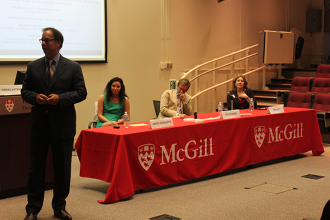 Then Vera Roy, from the Société québécoise d’information juridique (SOQUIJ), explained how this Quebec government agency carries-out unofficial translation of the decisions of Quebec courts and tribunals. While providing concrete examples of the challenges that must be mastered by a legal translator in a bilingual and bijuridical country, Ms Roy brilliantly set out the weight and relevance of these translations, in Quebec and outside this province. To listen to Ms Roy's presentation, please click here: Vera Roy .
Then Vera Roy, from the Société québécoise d’information juridique (SOQUIJ), explained how this Quebec government agency carries-out unofficial translation of the decisions of Quebec courts and tribunals. While providing concrete examples of the challenges that must be mastered by a legal translator in a bilingual and bijuridical country, Ms Roy brilliantly set out the weight and relevance of these translations, in Quebec and outside this province. To listen to Ms Roy's presentation, please click here: Vera Roy .
Finally, the 2011 edition of the Summer Institute of Jurilinguistics closed with the kind words of Prof. Daniel Jutras, dean of the Faculty of Law of McGill University. The fifth Summer Institute was a striking success, a reminder that these institutes remain exemplary as scholarly encounters concerning Jurilinguistics. The organizers, the administrative officers of each of the centres which form the Network of Jurilinguistics Centres, and the participants, all expressed their enthusiastic reaction to this meeting.
Click here to view the program of the 5th Summer Institute of Jurilinguistics: Programme - 5th Summer Institute of Jurilinguistics [pdf]
This day was made possible due to the support of Justice Canada, and the QRCPCL extends thanks to the Dean’s Office.
4th Summer Institute of Jurilinguistics
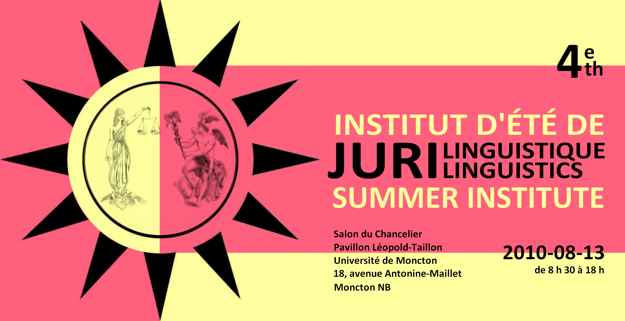
On 13 August 2010, two days before the National Acadian day, the Faculty of Law at the Université de Moncton hosted the fourth Jurilinguistics Summer Institute. The Institute was organized by the Quebec Research Centre of Private and Comparative Law (now known as the Paul-André Crépeau Centre for Private and Comparative Law), McGill University, in collaboration with the other members of the Network of Jurilinguistic Centres. It gathered over 40 participants from various backgrounds related to jurilinguistics. Among the participants were representatives from government, private practice and the academy. This year, the scholarly program of the day was divided into plenary sessions and workshops. The former took a more theory-based approach. On the other hand, the workshops, more than one of which coincided in time, took a more empirical approach, encouraging dialogue in small groups.
The day opened with words of welcome from Vice-Rector (Academic) Neil Boucher, followed by opening remarks from Prof. Lionel Smith, Director of the Centre. The first plenary session, presided over by Prof. Smith, focussed on analysis of the role of juriliguistic dictionaries. In particular, it was the occasion to launch a brand new dictionary: La common law de A à Z.
First, Prof. Olivier Moréteau, from Louisiana State University (Baton Rouge), shared an interesting stroll by a comparative lawyer, stepping nimbly from letter to letter through the alphabet. To listen to Prof. Moréteau’s presentation, click here: Moreteau . Then, Prof. Moréteau read aloud a message from Prof. Jacques Vanderlinden, who was unable to attend yet still wished to share a few remarks with the audience. To listen to the reading of this message, click here: Vanderlinden.
The second part of that morning’s plenary session was given by Mr Gérard Snow, Director of the Centre de traduction et de terminologie juridiques (CTTJ) at the Faculty of Law, Université de Moncton. Mr Snow presented the origins and preparation of the dictionary La common law de A à Z. To listen to Mr Snow’s presentation, click here: Snow .

Then the plenary session concluded with the launch of the dictionary. First to present this work was Me Louis Bossé, Product Development Manager at Yvon Blais, followed by Me Andrée Duchesne, Senior Counsel and Manager, Francophonie, Justice in Official Languages and Legal Dualism, with Justice Canada.
After a short break, during which participants continued to engage in lively discussion, two workshops were held. The first one, presided over by Me Jean-Frédérick Ménard, concerned the use of jurilinguistic dictionaries. Another new dictionary was launched during this workshop: Dictionnaire juridique de la propriété au Canada. The presentation was given by Me Anne Des Ormeaux and Mr Jean-Marie Lessard, the authors of this work. Then, Me Christian C.-Després spoke about the Supreme Court of Canada’s participation in the development of legal terminology in Canada. Last, Me Louis Fortier presented a set of tools for the legal professional/translator.
The second of the morning workshops, presided over by Ms Jimena Andino Dorato, concerned legislative drafting. Ms Judith Keating presented the electronic version of the Statues of New Brunswick. Then, from Quebec, Me Edmund Coates spoke about an extensive revision to the English text of the Civil Code of Québec, and the history leading-up to this project. Last, Ms Josée Baril analyzed the role of Jurilinguistics in legal drafting.
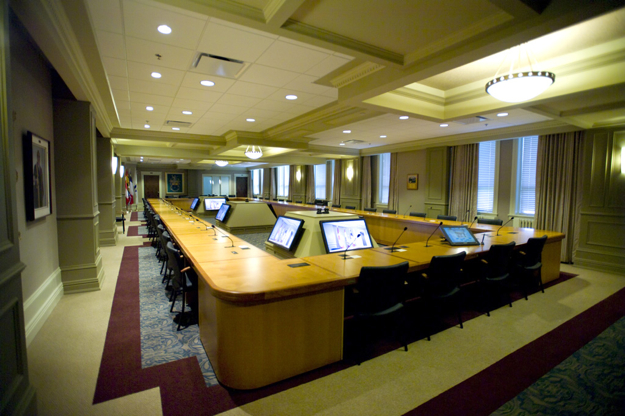
In the afternoon, the plenary session was presided over by Prof. Carmen Roberge, from the Collège universitaire de Saint-Boniface. During this session, Prof. Jean-Claude Gémar, from the Université de Montréal, analysed the knowledge and skills necessary to a jurilinguist. To listen to Prof. Gémar’s presentation, click here: Gemar .
Following this, a pair of workshops took place. One was presided over by Me Ménard. Its subject was the teaching of Jurilinguistics. Prof. Patrick Forget, from the Université de Moncton, and Prof. Iliana Auverana, from the University of Ottawa, shared their recent experiences with this. The other afternoon workshop, presided over by Ms Sylvette Savoie-Thomas, reflected on recent events regarding access to justice. On this occasion, Mr Donald Legal from the Centre canadien de français juridique inc. presented the “Programme pancanadien de formation en terminologie juridique” (the Transcanada Programme for Training in Legal Terminology). Then, Me Lionel Levert reflected on access to the law as an everyday challenge.
The last plenary session, presided over by Mr Snow, featured the Hon. Michel Bastarache. The latter’s presentation on bijuridism at the Supreme Court of Canada was a remarkable close to the day. To hear the Hon. Bastarache’s presentation, click here: Bastarache .
The 2010 edition of the Jurilinguistics Summer Institute fulfilled the wish to hold this day in Moncton, leading anew to a resounding success for this scholarly event which stands as an exemplar in its field. The organizers, the officers of the four centres which form the Network of Jurilinguistics Centres, as well as the other participants, expressed great satisfaction with respect to this gathering.
3rd Summer Institute of Jurilinguistics
Over 80 participants from various different backgrounds in jurilinguistics took part in the Third Summer Institute of Jurilinguistics that was held at the Faculty of Law of McGill University on August 31, 2009. The Institute was organized by The Quebec Research Centre of Private and Comparative Law (now known as the Paul-André Crépeau Centre for Private and Comparative Law), in collaboration with the other members of the Network of Jurilinguistic Centres. Amoung our participants were representatives from the Supreme Court of Canada, the Quebec Court of Appeal, the Translation Bureau, the Department of Public Works and Government Services Canada, the Department of Justice Canada, translators, lawyers and notaries from prominent Montreal firms. At the same time, professors and researchers from McGill University, University of Montreal, University of Sherbrooke and University of Milan (Italty) were also part of the participants. The program of the day was well adapted to the diversity of the particular audience. Academics and practioners who share an interest in juriliguistics were able to take this opportunity to make various presentations to the particiants.

The day began with welcoming remarks from the Director of the Center, Professor Lionel Smith, followed by the first session chaired by Me France Allard.
Me Francie Gow shared the experiences that allowed her to develop a career in legal translation first from the point of view as a law student and then as a translator-lawyer. She emphasized the importance for translators to take into account what they are not aware of in the law and the intrinsic difficulty of this exercise. Furthermore she elaborated on the importance of having a good sense of the procedural issues in order to accurately translate a judgement.

The second part of the session was moderated by Ms. Jimena Andino Dorato a doctoral student at the University of Montreal and researcher at the QRCPCL. Presenting a more theoretical perspective Ms. Andino Dorato presented various difficulties inherent in legal translation by using the publication process of a trilingual Civil Code of Quebec (Spanish, French and English) as illustration. In addition to presenting the strengths and weakensses of the method adopted during the translation process, she also highlighted the importance of jurilinguistics as part of legal theory and underlined the importance of the translator.
After a session break where participants continued to engage in lively disccusion, a round table moderated by Me François Blais followed. Presentations from Ms. Sylvette Savoie Thomas, Ms. Isabelle Chénard and Ms. Iliana Auverana focused respectively on the process of standardizing French vocabulary in the common law, the drafting of a standardization document and on the publications promoting access to justice in the two official langauges (PAJLO). During the discussions that followed the round table, questions of the possibility of updating files and fields of law whose vocabulary should be the subject of standardization were approached. The text of Ms. Thomas', Ms. Chénard's and Ms. Auverana's presentation can be found here: Sylvette Savoie Thomas Le processus de normalisation [pdf], Isabelle Chénard Techniques employées pour normaliser le vocabulaire français de la common law [pdf], Iliana Auverana Les publications du PAJLO - acquis et défis [pdf].
In the afternoon where the sessions were presided by Professor Yaëll Emerich, Ms. Gisèle Barnabé of the Joseph-Dubuc Institute analyzed the possiblity of implementing a legal training model offered in French to Manitoban health care profesessionals by the Joseph-Dubuc Institute. Like all health care programs aimed at increasing access to the health system in French for Manitoban Francophones, the establishment of a legal training program for professionals would help access to justice in French.
Following this, Ms. Aileen Doetsch, translator for the Max Planck Institute in Hamburg presented the difficulties of jurilinguistic translation of legal doctrine especially in light of the diverse languages and legal systems in the European Union. Based on her experiences with translating articles of comparative law from German to English, Ms. Doetsch pointed out the difficulties facing the translator when they must mediate between not only different languages but also different legal cultures.

The last session was moderated by Mr. Justice Nicholas Kasirer who was just recently nominated to the Quebec Court of Appeal. After presenting a vivid illustration of the debate between supporters of the standardization theory and the exoticization of translation theory, Mr. Justice Kasirer reflected on his thoughts of the issues raised by the late author Gérard Cornu who believed that the law and its expression in the French language were inseparable. Mr. Justice Kasirer wondered what place is left for the Civilian French of Cornu in the English translation he was preparing. It was then Acting Dean Daniel Jutras who had the task of concluding the day’s discussions. Dean Jutras highlighted that the summer Institute of Jurilinguistics inaugurated two new rooms at the Law Faculty and celebrated that the area had experienced its baptism by fire as part of such an exciting event. He then invited the participants to join him for cocktails in the Faculty of Law’s Atrium.
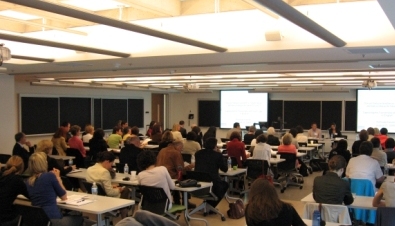
The 2009 edition of the summer Institute of Jurilinguistics was a resounding success because of the large number of important topics in the program. The organizers, officials of member jurilinguistic centres and participants expressed great satisfaction at the success of the event.

